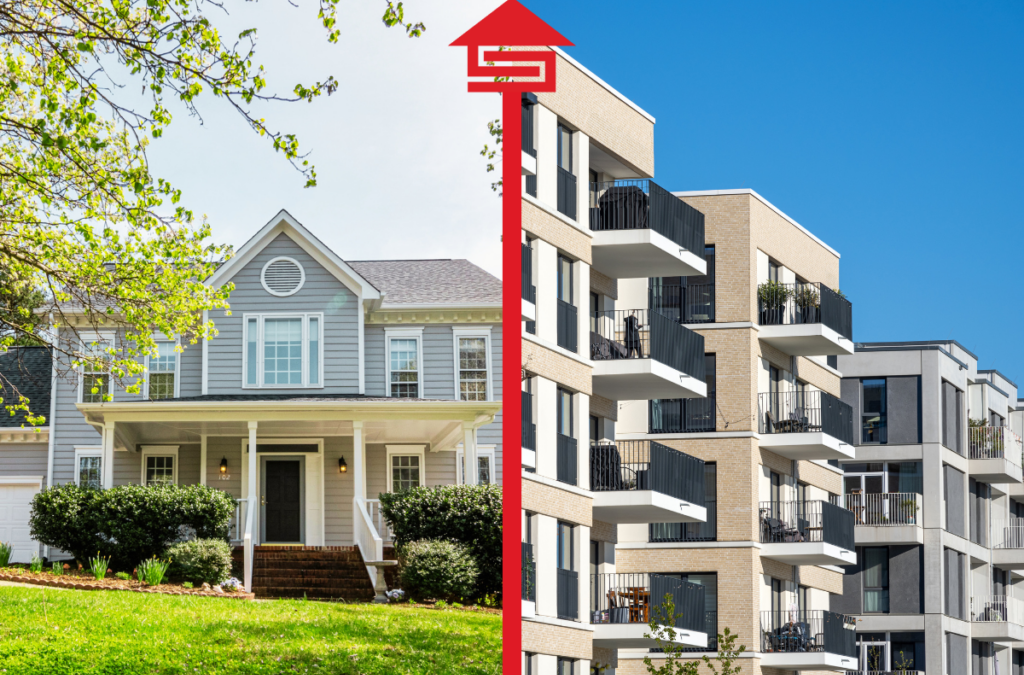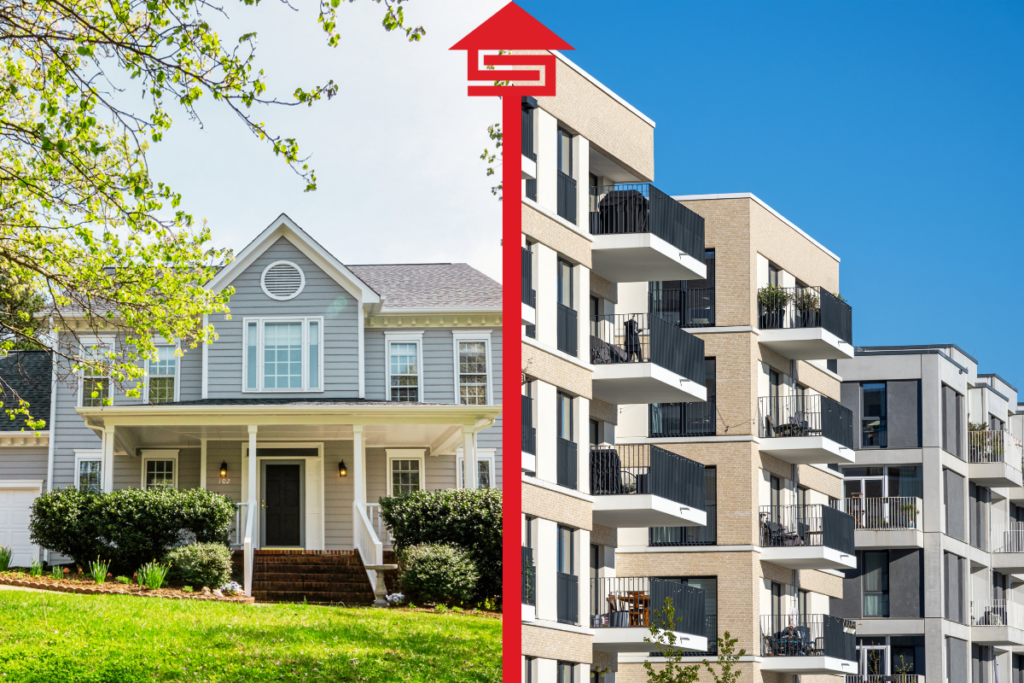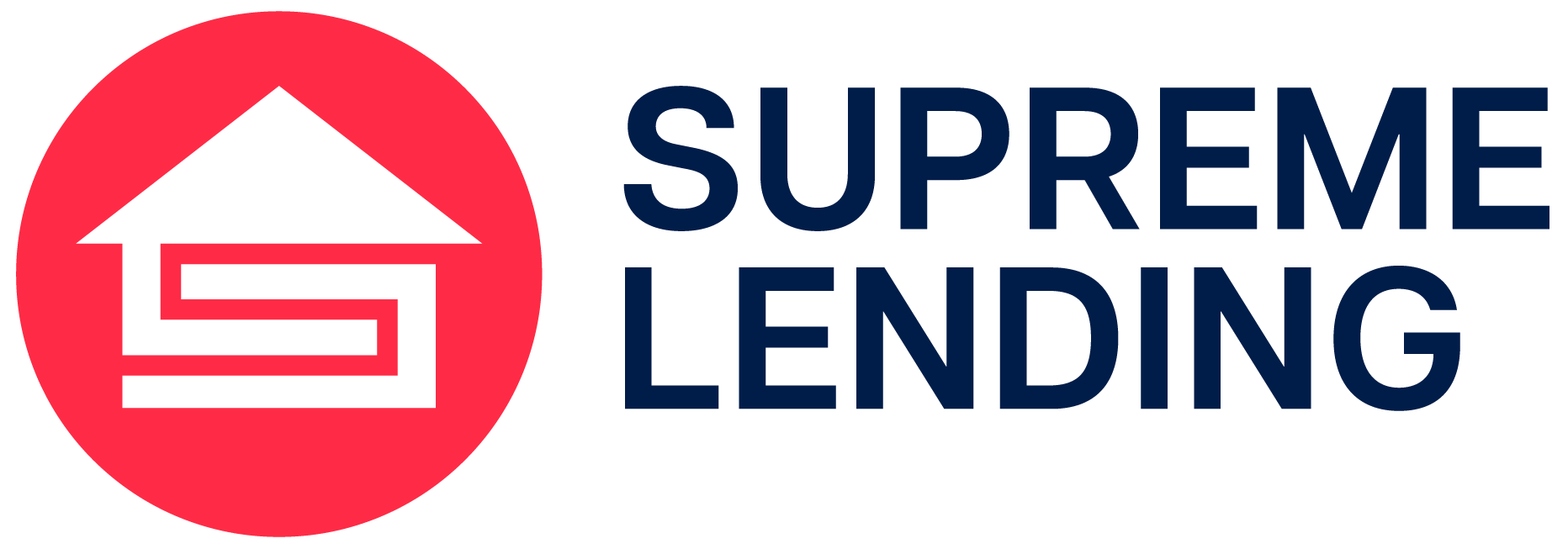
by Supreme Lending | Nov 3, 2024
An Overview of Supreme Lending Credit Score Requirements

When you’re preparing to buy a home, understanding the mortgage credit score requirements is essential. Your credit plays a significant role in determining your eligibility for various loan programs, as well as interest rates you may qualify for. Our goal at Supreme Lending is to provide the smoothest mortgage experience possible, that includes guiding you with transparent information to help you to make an informed, confident decision. Here’s an overview of Supreme Lending’s credit score requirements for common loan programs and frequently asked questions.
Conventional Loans
Conventional loans are popular among homebuyers due to their flexibility and competitive interest rates. As a general rule of thumb, Supreme Lending requires a minimum credit score of 620 for Conventional loans. However, a higher score typically results in securing more favorable rates and terms.
FHA Loans
Insured by the Federal Housing Administration, FHA loans are another common mortgage option –especially for first-time homebuyers or borrowers with lower credit. These loans have more lenient credit score requirements, accepting as low as 580.
VA Loans
For eligible military Veterans and active-duty personnel, VA loans offer affordable options as they don’t require a down payment or mortgage insurance premiums. Like FHA loans, Supreme Lending’s credit score requirement for VA loans is a minimum of 580.
USDA Loans
Guaranteed by the U.S. Department of Agriculture, USDA loans provide affordable financing designed for homebuyers in designated rural areas with no down payment required. In general, Supreme Lending’s credit score requirement for this program is 600.
Jumbo Loans
Jumbo loans are used to purchase high-value properties with a loan amount greater than conforming loan limits, which is $766,550 for one-unit homes in 2024. Due to potential higher lending risk, Jumbo loans typically have stricter qualifications. Supreme Lending has jumbo programs with a minimum credit score of 680, but depending on the loan guidelines, some may require at least a 720 credit score or higher.
Frequently Asked Questions
Now that you have a snapshot of common credit score requirements at Supreme Lending, here’s some more insight on how your credit can impact your mortgage.
How is a credit score determined?
A credit score, often represented by a FICO® score, is a numerical assessment of a borrower’s financial health. It is calculated based on several key factors:
- Payment History: Your record of on-time payments versus late or missed payments.
- Credit Utilization: The amount of credit you’re using compared to your total credit limits.
- Length of Credit History: The duration of time you’ve had credit accounts open.
- Types of Credit in Use. The variety of credit accounts you have, such as credit cards, mortgages, and car loans.
- Recent Credit Behavior. This includes how many new credit accounts you’ve opened recently and credit inquiries.
Combining these factors provides a numerical score to help reflect your creditworthiness.
What qualifies as a generally “good” credit score?
In general, a credit score of 670 to 739 is considered good according to FICO® standards. Scores in this range suggest that you are a responsible borrower with a solid history of managing credit well. 740 or higher is considered very good or exceptional. Remember, a higher the credit score usually results in more favorable mortgage rates and terms.
Additionally, a credit score between 580 and 669 is considered fair. This range aligns with many of the credit score requirements outlined above depending on the loan type. So don’t fall victim to the common mortgage myth that you need perfect credit to qualify for a home loan.
What’s the difference between a soft credit pull and hard credit pull?
When applying for a mortgage, lenders need to pull your credit report. There are two ways to do this:
- A soft credit pull is a credit check that doesn’t affect your credit score. It’s typically used for pre-qualifications or when you check your own credit. Supreme Lending has this option when you get pre-qualified for a mortgage.
- A hard credit pull, on the other hand, occurs when a lender reviews your credit score as a formal credit application during the loan approval process. Hard pulls can temporarily lower your credit score by just a few points. However, there’s no significant impact, which is another mortgage myth to debunk.
Here to Help
Don’t navigate the mortgage process alone! Our experienced and knowledgeable team at Supreme Lending is here to help you understand all aspects of your homebuying journey. From understanding credit score requirements and determining which loan program may work for you to our seamless underwriting process, we help you close your loan with confidence.
Contact us today to get started!
Related articles:
Common Credit Score and Down Payment Requirements by Mortgage Type
FHA Loans vs. Conventional Mortgage: Which One Is Right for You?

by Supreme Lending | Oct 10, 2024
Discover the Key Differences Between a Condo vs. Single-Family Home

So you’ve finally decided to end the debate of renting vs. owning a home and pull the trigger on your homebuying journey. Congratulations! The next big question is deciding what kind of property you want to purchase—a condo vs. single-family home. Both options offer the potential to build equity, but the right choice comes down to your lifestyle, budget, and long-term goals.
To help you decide, here’s an overview the pros and cons of each option and how Supreme Lending may help you finance your dream home, whether it’s a condo or a single-family house.
Pros & Cons of Buying a Condo
Pros
- Lower Maintenance. One of the biggest benefits of condo living is that most exterior maintenance and landscaping are handled for you by the Homeowners Association (HOA). If you’re looking for a lower-maintenance lifestyle where you can focus on enjoying your space without the hassle of yard work or home repairs, you may want to consider a condo.
- Amenities. Many condo communities offer shared amenities such as pools, gyms, and clubhouses. This can provide luxurious perks without the extra cost of maintaining the amenities yourself.
- Affordability. In general, condos may be more affordable than single-family homes. For this reason, they are a great option for first-time homebuyers or those looking to downsize. If you’re trying to buy in a competitive housing market, a condo may offer a more budget-friendly option to open the door to homeownership.
- Location. Condos are often located in urban areas or desirable neighborhoods with easy access to dining, shopping, and public transportation. If you enjoy the vibrancy and convenience of city living, a condo can put you right in the action.
Cons
- HOA Fees. While HOAs manage the maintenance of shared spaces and amenities, that comes with a monthly cost. These fees can add up, and it’s important to factor them into your budget when considering the overall homebuying costs.
- Limited Privacy. Since condos are often in multi-unit buildings, you’ll likely be sharing a wall with neighbors. If privacy and quiet are important to you, this is something to consider.
- HOA Restrictions. HOAs typically have rules regarding what you can and cannot do with your unit, from the color of your front door to controlling whether you can rent it out. While these rules are put in place to help maintain the property’s value, they may also limit your freedom.
Pros & Cons of Buying a Single-Family Home
Pros
- More Space. Single-family homes typically offer more living space, both indoors and out. If you need room for a growing family, pets, or hobbies, or simply enjoy having a larger yard, a house may give you the space and flexibility you need.
- Privacy. Unlike condos, single-family homes can provide more privacy since you wouldn’t be sharing a wall with your neighbors. If peace and quiet are priorities, a standalone house may be your answer.
- Freedom to Personalize. As a single-family homeowner without an HOA, you have the freedom to make changes and renovations to your home. Want to build a deck, repaint your exterior, or add on more square footage? You would have the flexibility to do so.
- Suburban and Rural Living. Many single-family homes are located in suburban or rural areas. This may offer a quieter, more relaxed lifestyle away from the hustle and bustle of city life.
Cons
- Maintenance Responsibilities. With the freedom of owning a standalone property comes the responsibility for home maintenance, repairs, and upkeep. From mowing the lawn to fixing a leaky roof, you’ll be responsible for keeping everything in good condition.
- Higher Cost. Oftentimes, single-family homes may be more expensive than condos, both in terms of purchase price and ongoing costs such as property taxes, insurance, and utilities. Be sure to keep those additional costs in mind when deciding to buy a condo vs. a single-family home.
- Location. While one of the perks of single-family living is being in a more suburban or rural area, that also means you may be father away from city centers. This could result in a longer commute or less access to urban amenities.
How Do You Decide?
When choosing between a condo vs. a house, here are four helpful considerations:
- Lifestyle. Do you prefer a low-maintenance, lock-and-leave lifestyle with shared amenities? Or do you value privacy and space to personalize your property? You daily routine and personal preferences should guide your decision.
- Budget. While condos may have lower upfront costs, you’ll need to factor in HOA fees. On the other hand, single-family homes may require more financial investment in terms of ongoing maintenance.
- Location, Location, Location. Think about where you want to live. Do you prefer the convenience of urban life? Or do you dream of a suburban or rural retreat? The location has a direct impact on your lifestyle and commuting needs.
- Long-Term Goals. If you’re planning to grow your family, need extra space for hobbies, or want the freedom to make home improvements, a single-family property may make more sense. But if convenience and lower maintenance are calling your name, a condo may be the right fit.
The Benefits of Homeownership – No Matter What You Choose
Whether you opt for a condo or a standalone home, you’ll still enjoy all that homeownership has to offer. Owning your own place may give you the potential to build equity and financial stability. You’ll also have the flexibility to create a space that truly reflects your personality and lifestyle. Plus, homeownership has the potential to provide long-term rewards, as your property may appreciate in value over time.
Supreme Lending Has You Covered
Ranked as a 2024 top 15 retail lender in the country by Scotsman Guide, Supreme Lending has a wide range of mortgage options to help put people into homes—whether it’s a condo or single-family. Whatever your dream of homeownership may look like, we’re here to help with your home financing needs.
Ready to get started? Reach out to our team today!
Related Articles:
by Supreme Lending | Oct 7, 2024
Your Helpful Guide to Mortgage Homebuying Tips

Buying a home is one of life’s biggest milestones—a place to make lasting memories, build your future, and truly create a place to call your own. But let’s face it: the homebuying process can feel a bit overwhelming at first. But with the right preparation and guidance, you can navigate your mortgage smoothly and confidently. Whether you’re just thinking about purchasing a new home, buying for the very first time, or a seasoned pro, these 10 mortgage homebuying tips will help you make sense of the process and set you up for success.
1. Save for a Down Payment Early
One of the most important mortgage homebuying tips is saving for a down payment. While some loans may require as low as 3-5% down, the more you have saved, the better. A larger down payment also means a lower loan amount and reduced monthly payment. Working with your local lender early on in the process can help you plan for how much to save for.
2. Don’t Wait to Get Pre-Qualified
Before you even start house hunting, the first step in the homebuying process is getting pre-qualified for a mortgage. Pre-qualification gives you an initial idea of how much you may be able to afford based on information you provide to your lender, including your assets, income, and credit score. Getting a mortgage pre-qualification or pre-approval can also show sellers that you’re a serious, capable buyer.
3. Compare Loan Types
Not all mortgages are the same, so it’s important to understand your options so that you can make an informed decision when it comes to financing your home. Whether it’s a Conventional, FHA, VA, or USDA loan, each comes with its own set of guidelines and down payment requirements. There are also several alternative financing programs including a jumbo loan, bank statement loan, and investment property loans.
4. Explore Down Payment Assistance Programs
Do you know about down payment assistance programs that may be available? These programs are designed to help more people become homeowners with affordable options and flexible guidelines. Depending on the program, assistance can be offered through grants, forgivable loans, deferred payment, or tax credits. Don’t hesitate to ask your lender about these potential opportunities, as they may make a big difference in your homebuying journey.
5. Have Your Documentation Ready
When it comes time to apply for your mortgage, you’ll need to provide a variety of documentation so that your lender can verify your income, employment, and creditworthiness. Common documents include pay stubs, tax returns, bank statements, and W-2s. Having these ready may help speed up the process and avoid delays.
6. Know What’s Included in Your Loan Estimate
After you apply for a mortgage, you’ll receive a Loan Estimate (LE). This document provides you with important information regarding your mortgage application, including the estimated principle payment, interest, taxes, and insurance—also known as your mortgage PITI.
7. Prioritize Both an Appraisal and Home Inspection
During the mortgage process, it’s crucial to understand the appraisal and home inspection—and why you should opt to do both. The appraisal is an assessment of the home’s value that most lenders require. This helps confirm that the loan amount aligns with the property’s market value. Meanwhile, the home inspection evaluates the property’s condition and systems. A home inspector can identify any potential repairs or issues, such as roofing damages, electrical problems, or structural concerns.
8. Avoid Large Purchases or New Credit
It’s also important to hold off on making any large purchases or opening new lines of credit during the mortgage approval process. Big expenses like buying a car or furniture, or applying for a new credit card, may affect your credit score and debt-to-income (DTI) ratio. To keep your loan approval on track, avoid major financial moves until after you’ve closed on your new home.
9. Understand Costs Beyond the Down Payment
While the down payment is a big part of the homebuying process, don’t forget about the additional costs involved in securing a mortgage. Beyond the down payment, you’ll need to consider closing costs, which are other fees to process the loan that typically range from 2-6% of the loan amount. Another potential expense is mortgage insurance, which is required for FHA loans and if your down payment is less than 20% for Conventional.
10. Review the Closing Disclosure
Before officially closing on your home, you’ll receive a mortgage Closing Disclosure (CD). This document provides a transparent summary of all loan details, including terms, projected payments, closing costs, and a transaction summary. Lenders are required to provide your disclosure no later than three days before your scheduled closing. Be sure to carefully review all information to ensure it’s correct to avoid any potential delays.
Supreme Lending Is Here to Help
As you can see, the homebuying process has a lot of moving parts. Keeping these mortgage homebuying tips in mind will help ensure your loan experience is a smooth one.
At Supreme Lending, we’re here to guide you every step of the way. Want to learn more about our mortgage services or ready to start your homebuying journey? Contact your local branch today!
by Supreme Lending | Aug 12, 2024
Unlocking Homeownership With Mortgage Gift Funds

When it comes to purchasing a home, the down payment is often a big hurdle for borrowers, especially first-time homebuyers. However, there may be an opportunity to help make homeownership a reality through mortgage gift funds. If you’re offered gift funds to use toward a home’s down payment or closing costs, it’s important to understand how the process works and what is needed. At Supreme Lending, we’re committed to guiding you through the mortgage process to achieve your dream of owning a home—that includes navigating gift funds.
What Are Mortgage Gift Funds?
Gift funds are sums of money given by family members, friends, or other eligible benefactors that can be used for the down payment or closing costs on a home purchase. These funds are a generous way for loved ones to help you invest in your homeownership journey without any expectation of repayment.
How Do Gift Funds Work?
Using gift funds for a mortgage is straightforward but requires adherence to certain rules to ensure they’re accepted by lenders. Here’s what you need to know:
- Documentation. The donor must provide a gift letter stating the amount of the gift, the relationship to the recipient, and that no repayment of the money is expected or required.
- Source Verification. Lenders will require proof of the donor’s ability to give the gift, often in the form of bank statements.
- Transfer Trail. It’s also crucial to provide documents verifying the transfer of funds from the donor to the borrower to satisfy lender requirements.
Lenders require these factors as confirmation that the gift isn’t in fact a loan, which would impact the borrower’s Loan-to-Value (LTV).
Guidelines for Loan Types
Depending on the type of loan you’re considering, there are specific guidelines to follow when using gift funds. These specify who may be eligible to provide the money and how much.
Conventional Loans
For conventional loans, gift funds may be used for some or all the down payment, closing costs, and financial reserves—as long as it’s from an acceptable source. The gift can be provided by a defined family member, including relatives by blood, marriage, adoption, legal guardianship, or domestic partner. The donor may not be or have an affiliation with the real estate agent, builder, developer, or any other interested party to the transaction.
Gift funds can be used for a primary residence and second home. Investment properties are not eligible. Minimum borrower contributions may apply depending on the down payment amount.
FHA Loans
Insured by the Federal Housing Administration, FHA loans offer a little more flexibility when it comes to mortgage gift funds. Donors can be family and other eligible givers such as a close friend, an employer or labor union, and charitable organization. A governmental agency or public entity that provides down payment assistance programs may also be eligible. However, cousins, nieces, and nephews are not qualified to provide gift funds for FHA.
VA and USDA Loans
While these government-insured loan options do not have down payment requirements, gift funds can still be used to cover closing costs. The gift can be provided by anyone that does not have an affiliation with the transaction. However, gift funds cannot be used to meet reserve requirements for VA and USDA loans.
Advantages of Mortgage Gift Funds
Ultimately, gift funds can help open doors to homeownership if you may not have qualified without the funds for a down payment or closing costs. Potential benefits of receiving gift funds include:
- Lower the financial burden of a down payment
- Improve your Loan-to-Value ratio
- May help you qualify for a more favorable mortgage
- Allow you to maintain savings for other expenses or emergency funds
Down Payment Assistance Alternatives
If you don’t have the option to receive gift funds, there may be other options to consider buying a home with less upfront costs. For example, FHA loans require a lower 3.5% down while VA and USDA loans offer no down payment requirement. For Conventional loans, eligible first-time homebuyers may put down just 3%.
There are also several down payment assistance programs designed to help more people achieve homeownership. Supreme Lending offers the Supreme Dream Down Payment Assistance that offers a fully forgivable second loan to cover the down payment and closing costs. There are also several local, regional, or state-specific programs available to provide aid. Eligibility typically depends on factors such as income, credit score, and location.
Our team at Supreme Lending believes that informed homebuyers make empowered homeowners. Understanding gift funds and alternatives for down payment assistance can help open doors to homeownership that might otherwise seem closed.
Ready to take the next step to buying a home? We’re here to guide you every step of the way. Contact your local branch to get started.
by Supreme Lending | Jul 29, 2024

If you’re thinking of buying a home, you may want to consider the possibility of seller concessions to help reduce upfront loan expenses. Imagine having a portion of your mortgage closing costs covered or even getting some essential home repairs taken care of without having to dig into your savings. That’s where seller concessions come in, also known as seller assistance. It can be a significant benefit for both buyers and sellers. In this guide, we’ll explore what seller concessions are, seller assist limits, and frequently asked questions.
What Are Seller Concessions?
Seller concessions are contributions paid by the seller that go toward the homebuyer’s closing costs. These can include closing fees, prepaid expenses, or even home repairs or improvements. These concessions can help lower the amount of money a buyer needs to bring to the closing table, making the home purchase more affordable.
The concession amount can be expressed as a percentage of the home’s purchase price or fixed dollar amount.
Examples of What Seller Concessions Can Cover
Seller concessions can be used for a variety of mortgage and homebuying costs including:
- Loan Origination Fees. Fees charged by the lender for processing the loan application.
- Appraisal Fees. This is the cost of having a home appraised.
- Home Inspection Fees. This is the cost of having a home inspected before closing.
- Property Taxes. Prepaid property taxes may be included in closing.
- Title Insurance. This insurance protects the buyer and lender from potential disputes over ownership.
- Discount Points. Also known as mortgage points, these help pay down the interest rate using upfront costs.
- Home Repairs or Improvements. Costs for necessary repairs identified during the home inspection or agreed-upon improvements before the sale.
How Do They Work?
- Negotiation. Seller concessions are typically negotiated as part of the buyer’s and seller’s purchase agreement. This request can be made with help from a real estate agent.
- Agreement. If the seller agrees to concessions, the specific details are outlined in the contract and must not exceed a specified limit depending on the loan type.
- Appraisal. The agreed-upon concessions cannot inflate the property’s value. Lenders require an appraisal to ensure the property’s market value supports the loan amount, including the concessions.
- Loan Approval. The lender will review the agreement and appraisal. This will ensure that the concessions align with the mortgage program’s guidelines.
- Closing. When the loan is ready to close, the costs are applied to the buyer’s closing costs or other agreed-upon expenses.
Who Benefits from Seller Concessions?
Both the buyers and sellers can benefit!
- Buyers. Concessions can lower the upfront costs needed to buy the home, making it easier to afford the property.
- Sellers. Offering concessions can also make the home more attractive for potential buyers, helping sell the home quicker.
Seller Assistance Limits
Limits on how much a seller can contribute vary depending on the loan type and down payment:
Conventional Loans
- Primary residence and second homes:
- 3% maximum with less than 10% down
- 6% maximum with 10-25% down
- 9% maximum with more than 25% down
- Investment properties:
- 2% maximum regardless of down payment
FHA/USDA Loans
- 6% maximum toward closing costs and prepaid items
VA Loans
- 4% maximum toward prepaid items
- No limit for closing costs or reasonable discount points
Frequently Asked Questions
Can the seller cover the entire down payment?
No. Seller concessions cannot be used for the full down payment. They are typically used for closing costs, prepaid expenses, and other associated fees, while meeting the loan guideline limits.
Does seller assistance affect the loan approval process?
Seller concessions themselves do not affect loan approval, but lenders can consider the impact on the Loan-to-Value (LTV) ratio and may require specific guidelines.
How does it impact the home appraisal?
The home’s appraisal must support the purchase price, including any seller contributions. If the appraised value is lower than the agreed-upon price, the lender may require adjustments.
Can a buyer negotiate for concessions?
Yes! Homebuyers can request this during negotiations. It’s essential to work with a knowledgeable real estate agent to help navigate the process.
How do seller concessions benefit first-time homebuyers?
First-time buyers often benefit from this as they may have limited funds for closing costs and other expenses. Seller assistance is another great way for more people to unlock the door to homeownership!
If you’re ready to start your homebuying journey, your local Supreme Lending team is ready to help! Contact us to learn about your mortgage options and get pre-qualified today.







